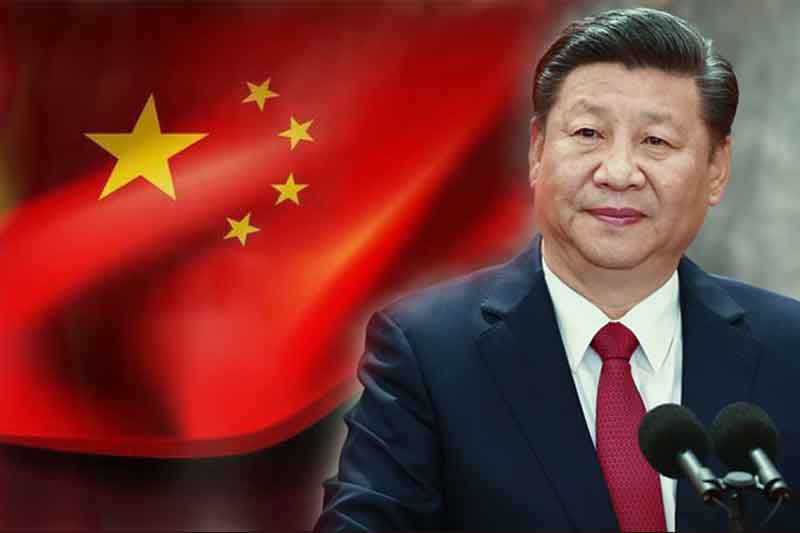
Unfavourable views of China have soared to historic highs in many countries in a new global poll by Pew Research Center.
Views of China have grown more negative in recent years across many advanced economies, and unfavourable opinion has soared over the past year, a new 14-country Pew Research Center survey shows. Today, a majority in each of the surveyed countries has an unfavourable opinion of China. And in Australia, the United Kingdom, Germany, the Netherlands, Sweden, the United States, South Korea, Spain and Canada, negative views have reached their highest points since the Center began polling on this topic more than a decade ago.
Negative views of China increased most in Australia, where 81% now say they see the country unfavourably, up 24 percentage points since last year. In the UK, around three-quarters now see the country in a negative light – up 19 points. And, in the U.S., negative views of China have increased nearly 20 percentage points since President Donald Trump took office, rising 13 points since just last year.
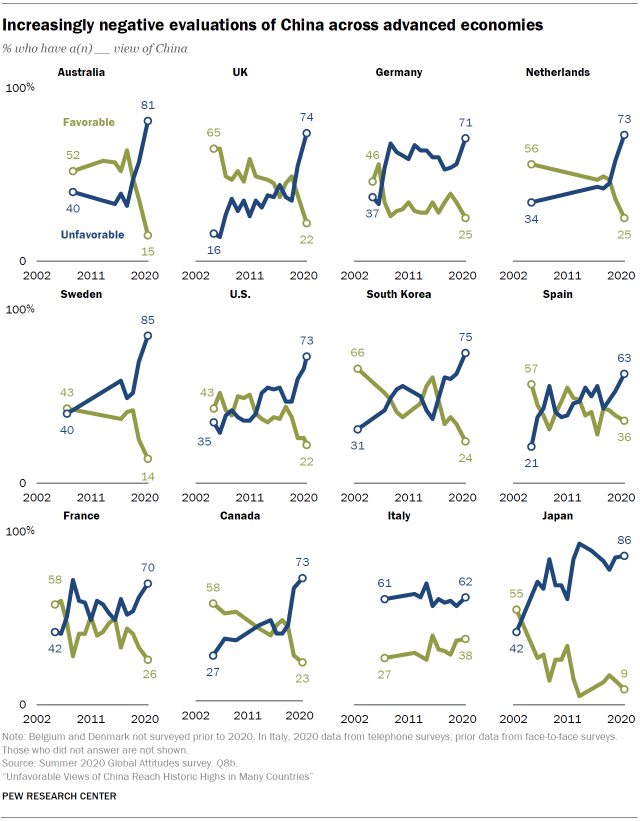
The rise in unfavourable views comes amid widespread criticism over how China has handled the coronavirus pandemic. Across the 14 nations surveyed, a median of 61% says China has done a bad job dealing with the outbreak. This is many more than say the same of the way the COVID-19 pandemic was handled by their own country or by international organizations like the World Health Organization or the European Union. Only the U.S. receives more negative evaluations from the surveyed publics, with a median of 84% saying the U.S. has handled the coronavirus outbreak poorly.
A median of 73% of those polled in 14 countries (Belgium, Japan, Italy, Denmark and France in addition to the nine named above) had unfavourable views of China.
In most countries, views soured significantly since just last year. For example, in Australia – where efforts to investigate China’s role in the spread of COVID-19 have led to heated trade frictions – negative views of China have gone up 24 percentage points since 2019. This is also the largest year-on-year change in Australia since the question was first asked in 2008.
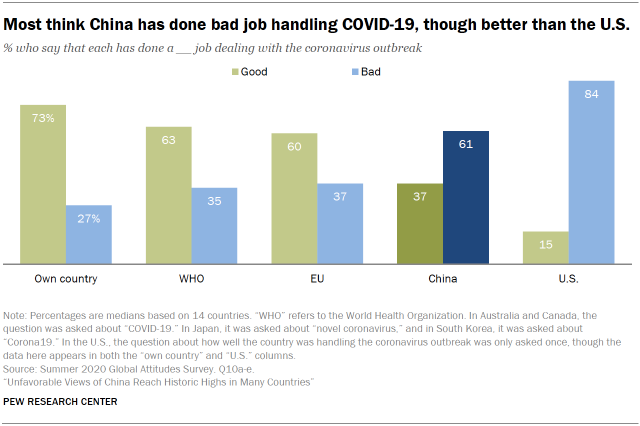
Negative views increased by double digits over the past year in the UK, Germany, the Netherlands, Sweden, the U.S., South Korea and Spain.
Australians had soured the most, with 81%, going up by 24 points over 2019; the last year has seen a sharp deterioration in ties between the two countries. Negatives views of China went up by double digits in the last one year in the UK, Germany, the Netherlands, Sweden, the US, South Korea and Spain.
Most think China has not handled COVID-19 outbreak well
After initial cases of the coronavirus started appearing in China’s Hubei Province in late 2019, many around the world questioned the expediency of China’s response to the outbreak, and others critiqued some of the measures Beijing used to contain the virus within its borders. But in Wuhan, the original epicenter of the outbreak, the strict lockdown has ended and the new case count plummeted to at or near zero by May.
Among the 14 advanced economies surveyed, most rate China’s COVID-19 response negatively. A median of 61% say China has done a bad job dealing with the coronavirus outbreak, while 37% believe the country has done a good job.

At least six-in-ten in Canada and the U.S. rate China’s handling of the coronavirus as poor. More than half in seven European nations share this view, including 72% in Denmark and 65% in Sweden. Spaniards and Italians are split, with nearly equal shares saying China has handled the pandemic well versus not well.
The most negative reviews of China’s COVID-19 response come from three nations in the Asia-Pacific region. More than seven-in-ten in Japan, South Korea and Australia say China has done a bad job dealing with the coronavirus outbreak, including more than four-in-ten in each country who say they did a very bad job.
Little confidence in President Xi to do the right thing in world affairs
Across the 14 countries surveyed, a median of 78% say they have no confidence in Chinese President Xi to do the right thing when it comes to international affairs, with at least seven-in-ten in every country saying they lack confidence in Xi. Only a median of 19% express any trust.
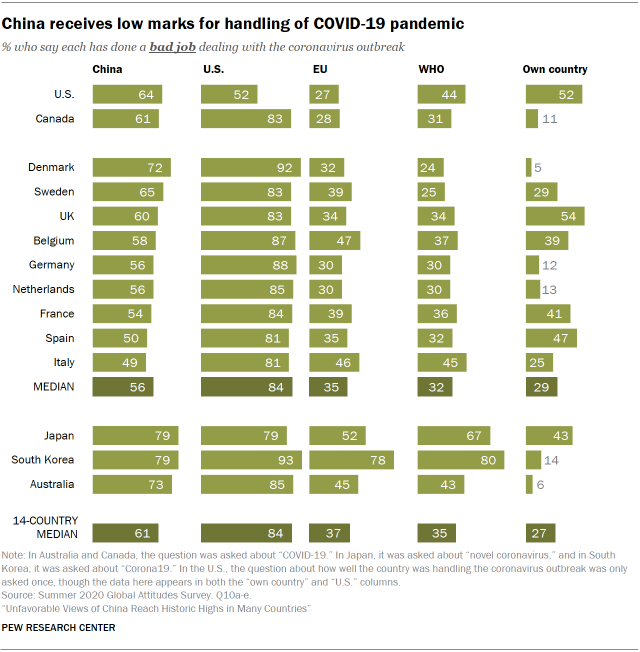
In the U.S., a majority say they have no confidence at all in Xi (55%), and about half in Canada say the same (47%). No more than a quarter report having any confidence in him in either country.
Europeans report similarly low levels of trust in Xi. A third or more in each country surveyed say they have no confidence at all in the Chinese president, including at least half in Sweden, France and Denmark.
About half in Japan and Australia also say they have no confidence at all in Xi. Japan also stands out as a country where less than 0.5% of the public – effectively no one – reports having a lot of confidence in China’s president, though no more than 5% report having a lot of confidence in him in any country surveyed.
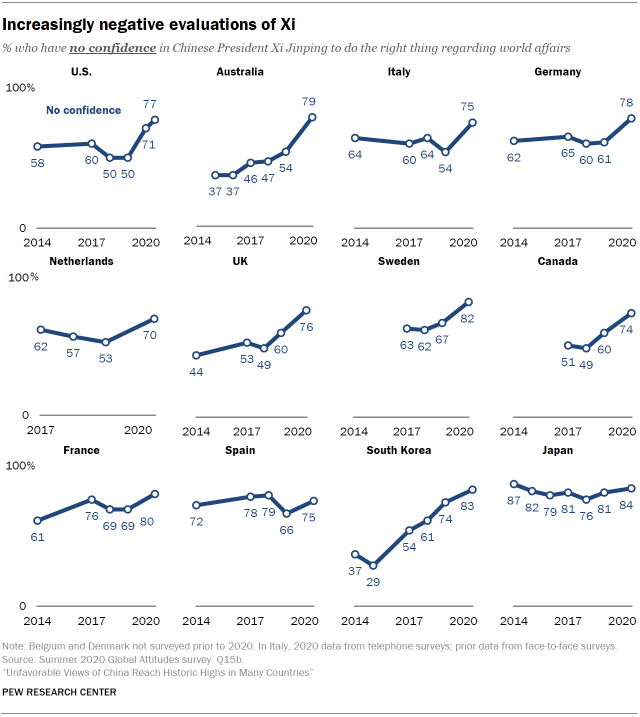
The survey also asked about confidence in five other world leaders. Only confidence in U.S. President Trump is lower than confidence in Xi. When considering median confidence, Russian President Vladimir Putin receives slightly higher marks, while confidence in European leaders Merkel, Macron and Johnson are at least twice as high as in Xi.
Distrust in President Xi has reached unprecedented highs in all countries for which past data is available except for Japan and Spain. The increase in distrust has been especially sharp in the last year; nine of 12 countries have seen a double-digit increase in the share who say they have no confidence in Xi. In Australia, for example, 54% had little or no confidence in Xi in 2019, and now 79% say the same, a 25 percentage point increase.
Source: https://www.pewresearch.org/global/2020/10/06/unfavorable-views-of-china-reach-historic-highs-in-many-countries/pg_2020-10-06_global-views-china_0-08/)













Comments